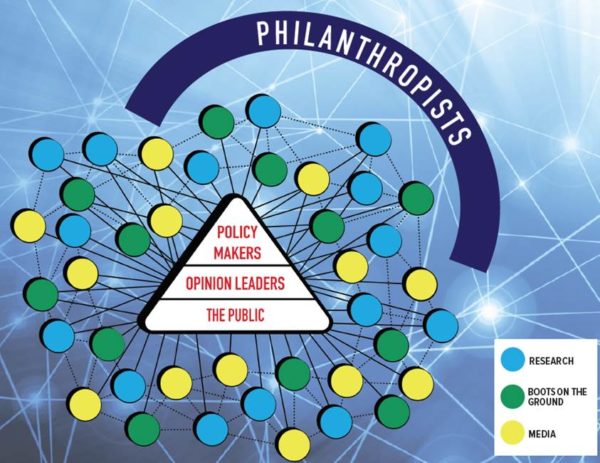Originally published in eJewishPhilanthropy on July 3, 2019.
By Adam Milstein
“United we stand, divided we fall.” This common phrase is used to promote unity and collaboration but is often difficult to implement in the world of advocacy, philanthropy, and nonprofits.
For instance, many pro-Israel organizations act to achieve similar – sometimes redundant – goals. Since each organization constantly needs to fundraise and stand above other groups, they find it difficult to work together and collaborate with each other.
In addition, and notwithstanding our community’s efforts to combat the growing Antisemitism in America, there hasn’t been much innovation in the space, and we seem to be doing more of the same.
To change this paradigm, we have to wield Solomon’s wisdom with David’s courage – in what I describe as the 21st Century Solomon’s Sling: the philanthropic multi-network collaboration model.
Broadly, there are at least four networks that can work together to make a significant impact: philanthropists, researchers and analysts, boots-on-the-ground, and the media. Each organization within each network is completely independent and has a unique and important role. Some members of these networks serve multiple functions, and their activities may overlap with the activities of other organizations within different networks.
Philanthropists share their vision and contribute time, connections, and financial resources to support research teams and on-the-ground activists. This collective vision is shared by researchers, who provide insight and strategy, while on-the-ground activists take action. The media organizations enhance awareness of the network’s results – with policy makers, opinion leaders and the public.
This theory was inspired by the late philanthropist Newton Becker, z”l. He recognized that smaller organizations have the ability to punch above their weight by being nimble and utilizing out-of-the-box strategies – and that philanthropists have the ability to bring unique vision, connections and experience to contribute much more than just a check.
About 20 years ago, I was fortunate to begin transitioning from a full-time businessman to an almost full-time philanthropist. My wife Gila and I, inspired by Becker’s call to “do more than just write a check,” decided to devote most of our time to what I call “active philanthropy.”
Like any successful business venture, we realize that we must be fully committed to our philanthropic investments – not only by contributing financial resources, but also by sharing our business vision, connections, marketing skills, operational know how, foundation staff time, and constant focus on improving the effectiveness of the programs we are supporting. After working for many years with a variety of organizations, we realized there were ways to improve philanthropy focused on Israel and the Jewish people to achieve greater impact.
The multi-network collaboration model integrates these findings and also mirrors some of the lessons I learned as a business. In business, you need to go the extra mile and work harder than your competitors to succeed; in philanthropy, you have to think outside-the-box to solve big challenges. In business, you work with different vendors to perform outsourced activities and must ensure smooth cross-functional collaboration within your organization; in philanthropy, successful long-term nonprofits build synergies and collaborations that complement each other’s unique work to achieve a greater impact.
Two years ago, I resurrected a regularly scheduled meeting for Los Angeles-based pro-Israel philanthropists, once hosted by the late Newton Becker, called the Impact Forum, which puts the multi-network model into practice. It has cultivated a network of active philanthropists who support a network of small, start-up-like organizations. Some organizations are research-focused, some act as boots-on-the-ground, and others are part of the media. By creating opportunities for collaboration between these four networks, we build synergies that drive maximum impact with limited resources.
This success is tangible. The Impact Forum has raised more than $1.6M to fund small and medium size organizations. That money represents a significant percent of these organizations’ annual budget, which allows them to focus on creating impact, rather than fundraising. The Impact Forum has also been an effective platform to connect philanthropists to research teams, media outlets and on-the-ground organizations, and to ensure that organizations work together.
A recent example that showcases this model’s impact is the campaign to substantiate the links between the Boycott Divestment and Sanctions (BDS) movement and Palestinian terrorist groups. First, several researchers, think tanks, and the Israeli government published research reports demonstrating the ties between BDS organizations and U.S.-designated terror organizations. Then, organizations within our multi-network collaboration model distributed the information, reaching state and federal agencies, campus administrations, other institutions, and millions of people on social media. Researchers and activists worked together to show the BDS Movement’s true colors with the assistance of the media, demonstrating how it inspires and supports violence against the Jewish people while masquerading as a human rights movement.
As a result, several State Attorney Generals put a greater focus on enforcing their states’ anti-BDS legislation. They are now leveraging the evidence that the BDS campaign is Antisemitic and aids terrorist groups. Omar Barghouti, the founder of the BDS movement, recently had his U.S. visa revoked. Several civilian lawsuits have been filed against U.S. based BDS organizations that raise funds for Palestinian terror organizations.
The impact is clear: create collaborating networks to defeat our detractors’ networks. We need the unique vision, knowledge, connections, and financial resources of many philanthropists to motivate and empower our networks. This is the most effective way to unite the pro-Israel community and fight anti-Semitism.
The 21st Century Solomon’s Sling, the philanthropic multi-network collaboration model, isn’t just a model for the Jewish or pro-Israel philanthropic world. It makes sense for all advocacy campaigns that seek to impact the world by shaping public opinion and influencing policy.
Adam Milstein and his wife Gila co-founded the Adam and Gila Milstein Family Foundation, providing charitable and philanthropic services to a wide range of organizations to strengthen the Jewish people, the State of Israel, and the U.S.-Israel relationship.
To reach Adam:
Twitter: https://twitter.com/adammilstein
Facebook: https://www.facebook.com/adammilsteincp/
Email: [email protected]

